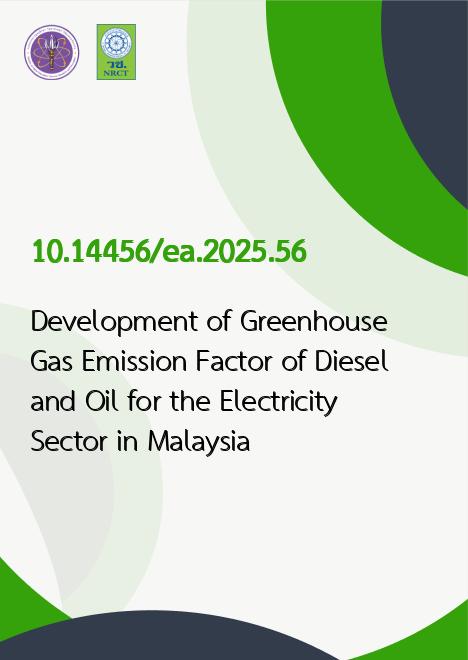
|
Development of Greenhouse Gas Emission Factor of Diesel and Oil for the Electricity Sector in Malaysia |
|---|---|
| รหัสดีโอไอ | |
| Creator | Mohamad Fetri Zainal |
| Title | Development of Greenhouse Gas Emission Factor of Diesel and Oil for the Electricity Sector in Malaysia |
| Contributor | Mohamad Fetri Zainal, Md Fauzan Kamal Mohd Yapandi, Nur Zaqira Izzati Sukhairul Zaman, Alexandra Quek, Zul Fadhli Ibrahim, Wan Nur Syuhada Wan Ata |
| Publisher | Thai Society of Higher Education Institutes on Environment |
| Publication Year | 2568 |
| Journal Title | EnvironmentAsia |
| Journal Vol. | 18 |
| Journal No. | 3 |
| Page no. | 122-134 |
| Keyword | Greenhouse gases, Electricity, Liquid Fuel, Flue gas, Emission Factor |
| URL Website | http://www.tshe.org/ea/index.html |
| Website title | EnvironmentAsia |
| ISSN | 1906-1714 |
| Abstract | The main purpose of this study is to develop the greenhouse gases (GHGs) emission factors for CO₂, CH₄, and N₂O from diesel fuel used in the electricity sector. Power plants are a major source of greenhouse gases among the fossil fuel combustion sectors; therefore, information on their emission factors is essential for establishing effective GHG emission control strategies. The emission factors derived in this study were validated against the 2006 IPCC Guidelines for National Greenhouse Gas Inventories. Country-specific emission factors were developed using site-specific data, such as fuel properties, stack sampling, and operational information for each type of power plant. The fuel composition is critical for determining the carbon content and quantifying the amount of diesel fuel used in power generation in Malaysia. These calculated values were used to determine the carbon content in the liquid fuel, provided its composition is known. The carbon content and net heating value (NHV) of the diesel fuel used by the power plants were identified. This method enables more accurate estimation of CO₂ emissions from the power sector at the country level. For non-CO₂ emissions, direct measurement using a gas analyzer was employed to derive the GHG emission factors. The CO₂ emission factor for dieselfueled power plants was estimated at 73,641.58 kg CO₂/TJ, based on the carbon content and calorific value of the fuel. For non-CO₂ gases, the emission factors were 3.42 kg N₂O/TJ for N₂O and 2.35 kg CH₄/TJ for CH₄. The EF of CO2 value is relatively close to the IPCC default value of 74,100 kg CO₂/TJ, with a difference of approximately -0.62%. Meanwhile, the CH₄ and N₂O emission factors are within an acceptable range when compared to the IPCC default values. The comparison with the 2006 IPCC default values indicates that the data presented are reliable and fall within an acceptable level of confidence. |